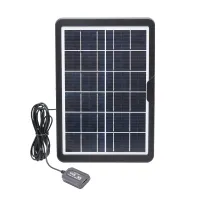Lightweight solar panels are a new generation of solar technology designed to be thinner, lighter, and easier to install compared to traditional solar panels. They are made using flexible materials, such as thin-film solar cells, which allow for reduced weight without sacrificing efficiency. This makes them ideal for applications where weight is a concern, such as on RVs, boats, and rooftops with weight restrictions.
One of the most significant advantages of lightweight solar panels is their ease of installation. Traditional solar panels require sturdy mounting structures, which add to the installation time and cost. In contrast, lightweight panels can often be mounted directly onto surfaces using adhesives, reducing the need for heavy and expensive mounting systems.
The flexibility of lightweight solar panels allows them to be installed on a wide range of surfaces, including curved or irregular surfaces that may not accommodate traditional solar panels. This makes them a great choice for mobile applications such as RVs, trailers, and boats. Additionally, they are useful for temporary installations or structures that cannot support heavy loads.
Since lightweight solar panels are thinner and weigh significantly less, they are easier to transport and install, which reduces shipping costs and installation time. This also makes them a suitable option for remote or hard-to-reach locations where traditional panels might be difficult or expensive to deliver and set up.
While lightweight solar panels offer many benefits, there are some challenges to consider. One potential drawback is their lower efficiency compared to standard crystalline silicon panels. Thin-film technologies, commonly used in lightweight panels, often produce less power per square meter, which may require more panels to achieve the same output.
Lightweight solar panels may also be less durable than their traditional counterparts. Because they are made from more flexible materials, they may not withstand harsh weather conditions as well as traditional rigid panels. This can affect their long-term reliability, especially in areas prone to extreme weather, such as heavy winds or hail.

Despite some limitations, lightweight solar panels are an excellent solution for certain applications. They are particularly suited for situations where portability and ease of installation are more important than maximizing energy output. For example:
RVs and Campers: Their flexibility and light weight make them ideal for mobile homes and campers where space and weight are limited.
Marine Applications: Boats and yachts benefit from lightweight panels as they can be easily mounted on curved surfaces and do not add significant weight.
Temporary Installations: They are useful for temporary power needs in off-grid or remote areas, where the ease of transport and setup is a major advantage.
Weight-Sensitive Roofs: Some residential roofs cannot bear the weight of traditional solar panels. Lightweight panels offer an alternative that avoids overloading the roof structure.
When selecting lightweight solar panels, it’s essential to consider factors such as energy needs, installation environment, and durability. The first step is to assess how much energy you need and how much space is available for the installation. Since lightweight panels may have lower efficiency, you might need more panels to achieve the desired energy output.
Even within the category of lightweight panels, there are differences in efficiency. Research the type of solar cells used and their efficiency ratings. Although thin-film panels are typically less efficient, some advanced models may offer competitive efficiency while maintaining a lightweight design.
It's also important to think about the installation process. Lightweight solar panels may not require mounting brackets, but they might need adhesives or special fixtures to ensure secure attachment to the surface. Make sure to choose a panel that is easy to install based on your specific application.
Lightweight solar panels offer a unique solution for applications where traditional panels may not be suitable. Their flexibility, ease of installation, and lower costs make them an appealing option for mobile, marine, and temporary installations. However, potential buyers should carefully evaluate their energy needs, installation conditions, and budget to make an informed decision. By weighing the benefits and challenges, businesses and individuals can determine if quality lightweight solar panels are the right fit for their energy needs.
Previous: Liquid Dewar Cylinder DPL450/550 Series
Next: Silent Generator For Home Buying Guide: What You Need to Know
Copyright:@2020-2021
Comments Please sign in or sign up to post.
0
0 of 500 characters used